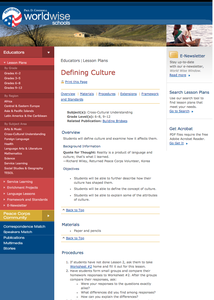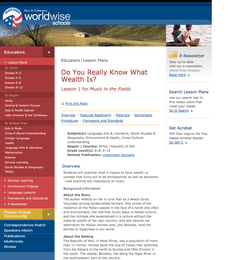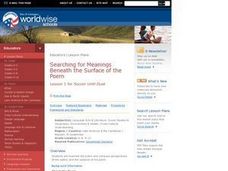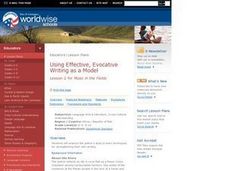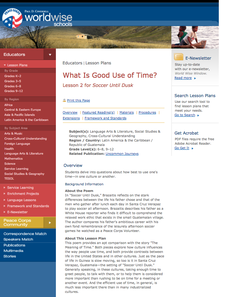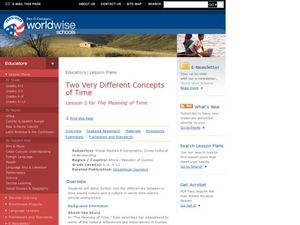Peace Corps
Starting Off the Day (and School Year) in Ukraine
Students compare the first day of school in Ukraine with the first day of school in the United States, including the challenges students and teachers both face in each country. They respond in class, in their journals, to the following...
Curated OER
Waking Up, Stepping Out
Students focus on a rich and colorful description of a culture unfamiliar to most of them. They compare the similarities and differences they find between Nepali culture and their own and determine our similarities as people can bridge...
Curated OER
Seeing the World in New Ways
Students probe their own histories to record how they have had to expand their world views. They determine "Everyone has a culture. It influences how we see the world, ourselves, and others." The explain the concept of cultural...
Curated OER
Using an Author's Clever Strategies in One's Own Writing
Students examine specific clever strategies of the author and incorporate them in their own writings. They emulate Storti's strategies in writing an arresting lead and share their pieces in a class discussion, allowing them to critique...
Curated OER
Defining Culture
Students define culture and examine how it affects them. They describe how their culture has shaped them, define the concept of culture, and explain some of the attributes of culture. The research the customs and culture of the groups...
Curated OER
Do You Really Know What Wealth Is?
Young scholars examine what it means to have wealth-a concept that turns out to be philosophical as well as economic-and examine the importance of music. They examine the concepts of wealth in Mali and in the United States and consider...
Curated OER
Geography, Climate, and Community in the Dominican Republic
Students familiarize themselves with the geography and culture of the Dominican Republic. They use primary source materials on the Dominican Republic to explore the question: How does where you live influence how you live? They describe...
Curated OER
Is That a Fact?
Students write examples of facts and opinions on the board. In groups, they develop their own definitions for facts and opinions and share with the class. In new groups, they complete a worksheet in which they place statements into the...
Curated OER
Reduce, Re-use, Recycle
Students determine the importance of recycling to reduce waste, to employ trash in useful ways, and to save the environment. They estimate the percentages of landfill waste that items constitute, based on what they found in their own...
Curated OER
Searching for Meanings Benath the Surface of the Poem
Students read "Soccer Until Dusk". As a class, they discuss the various settings and actions in the poem and discuss the life in Guatemala and compare it with the United States. To end the lesson plan, they complete a journal...
Curated OER
The Talking Goat Lesson
Students analyze the meanings and patterns of a folk tale. They respond in their reading journals to the following prompts: How do you feel about the way "The Talking Goat" ended? Why? Which did you like better: your group's predicted...
Curated OER
Using Effective, Evocative Writing as a Model
Students analyze the author's style to learn techniques for strengthening their own writing. They re-read "Music in the Fields" and highlight images that create vivid pictures in their minds-places where Young "shows, not tells" and...
Curated OER
What Is Good Use of Time?
Students delve into questions about how best to use one's time-in one culture or another. They explore the kinds of choices students will make about their use of time and consider the statement: "We are shaped by the values of the...
Curated OER
"Declaration (of a Kgomotso Girl)"
Young scholars explore the poem, "Declaration." Students discuss how elements of poetry such as tone work to convey meaning. Young scholars compare and contrast their lives and the lives of the poem's characters from South Africa.
Curated OER
Educating Village Girls
Learners explore the education of village girls. In this sociology lesson, students watch the slide show, "Healthy Girls, Healthy Villages" about Nigerian girls and women. Learners compare work in rural Lesotho with their own households.
Curated OER
Narrative vs. Expository Texts
Young scholars use examples of narrative and expository text to analyze and compare the two styles. Young scholars read articles on life in Lesotho and Madagascar and use graphic organizers and discussion to compare them. Young scholars...
Curated OER
Building a Model Springbox
Students examine ways to protect fresh drinking water. In this clean drinking water instructional activity, students listen to the story of Lauren Fry about building a springbox to collect groundwater. Students build a springbox.
Curated OER
Seeing Both Sides of an Issue
Pupils examine global issues from different perspectives. In this communication skills lesson, students participate in a classroom activity that requires them to take stances on issues and then consider the support of other perspectives...
Curated OER
A Modern Connection to Genocide
Students investigate the genocide that occurred in Rwanda. They read and discuss an article, watch a Frontline video, complete a worksheet for the video, and write a letter to the Rwandan government or United Nations about the...
Curated OER
The Extra Place Lesson
Young scholars take up the challenge of deciding what to do when confronted by a difficult and awkward situation. They read the story and highlight sentences or phrases that have particular meaning to them and think about and discuss a...
Curated OER
Modeling Our Writing Style After Another Author's Style
Students reread "The Senegalese Miracle" from a previous lesson. As they read, they must underline as many images related to their senses as possible and share their findings with the class. In partners, they practice chunking...
Curated OER
Asha's Village
Students compare and contrast their own culture with an Indian girl named Asha. In this culture lesson plan, students read, look at pictures, and make inferences.
Curated OER
Chatter
Students discover that cultural norms heavily influence how we communicate. They experience the challenge of using and interpreting unfamiliar communication patterns.
They identify strategies for successful cross-cultural communication.
Curated OER
Two Very Different Concepts of Time
Students delve further into the differences between a time-bound culture and a culture in which time seems almost unimportant. They answer the questions: How do people of different cultures view time differently? What can we learn from...






